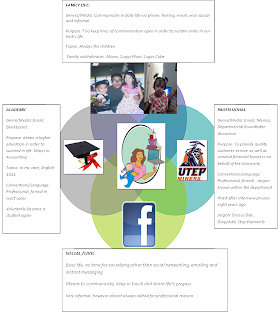 Discourse Community Map Response
Discourse Community Map Response
Michelle Sandoval
English 1311-Fall 2010
While my family is a rather small semblance of a discourse community, it is the most important discourse community that affects my life on a day to day basis. Of course I did not become a member of this particular community by choice, but rather by fate. For the most part, my personal family life revolves around the lives of my two children and my sister’s two children. My mother, two sisters and myself must constantly keep the lines of communication open in order to make sure that all four children are properly cared for. Most communication is done by texting and by email, which are generally blunt, informal, and to the point. However we tend to be around one another so often that verbal communication is key to making sure nothing gets lost in translation via the afore mentioned mediums.
Pursuing my education has been an idea that I have been toying with for many years. After much debate, I decided about a year ago that in order to further succeed professionally, education is a must. Returning to the world of academia has definitely proved challenging. However, it has occurred to me that by striving to succeed in college, I am setting a positive example for the children in my life. I am also hoping that I can also set an example for my more youthful counterparts in this class. It has been an intimidating, yet eye opening experience thus far. The mediums in which we students communicate with our peers and mentors have changed so drastically since my initial induction into college life. The work that used to be saved on word processors and floppy disks, are now saved on flash drives and electronic files. Papers that were once printed out on dot matrix printers and typewriters are now submitted electronically via forums such as Blackboard and email. Language and terminology used can vary depending on the situation. For example, as I type this paper out, I am careful to use eloquent, concise and professional rapport. When communicating with my classmates and my instructors, I try to maintain that air of professionalism whether we are communicating verbally in class, by email or Blackboard. General use of language changes drastically when hand writing or typing out class notes, as those are mainly for my own use. Class notes are generally blunt and abbreviated.
I feel that over the years within the workforce, I have been able to pick up certain professional writing habits that I can use both academically and professionally. I have the great esteem of being employed by this university in which I am now attending as a student. The job came at a time when it was desperately needed. I submitted a professional resume, which I composed myself, and interviewed for the position. Gratefully, I was chosen among others for the job because of my experience with cash handling and customer service. When I first came to work for UTEP eight years ago, I was what some might consider technologically challenged. I had never had an email account. I had never used the internet for anything before either. I learned rather quickly the importance and advantages of technology. The professional side of the academic world requires a certain level of diplomacy. You are constantly communicating with faculty, staff and students. Emails and memos must be well thought out as to convey a professional tone. If not carefully worded, a simple email can be misconstrued as rude or unprofessional.
This project has opened my eyes to the fact that I’m particularly civically minded. I suppose the demands of being a single, working mother might hinder my ability to be involved in church groups or do volunteer work. It’s those same demands that can also limit socializing to family oriented affairs. The main outlet in which I communicate with others is usually through social networking sites such as Facebook. It is a convenient tool because I can get a certain messages across to many people all at once. I can choose with whom I want to be friends with. I can also keep up with the current events that are going on with those friends’ lives. The language and terminology used is very informal. Terms such as LOL (laugh out loud) or IDK (I don’t know) are used frequently. Because this social networking site can be viewed publicly, it is still very important to keep the information posted respectful.
There are many ways in which we use writing as a tool of communication in our daily lives. It can be the composition of a term paper, sending a formal or informal email or memo to a work colleague, or texting a close friend. Some aspects of our lives require constant professionalism and etiquette, while others may remain informal. Either way you look at it, writing is a key factor in communication.